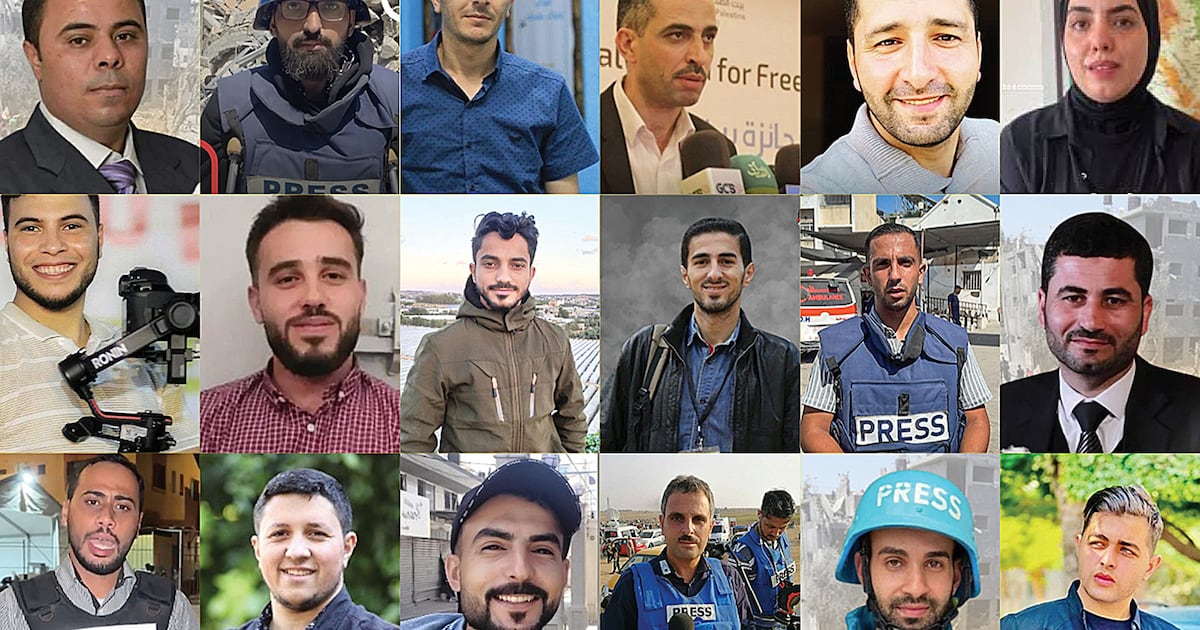World
Journalists Worldwide Protest Over Rising Death Toll in Gaza

Journalists globally are expressing outrage over the deaths of their colleagues covering the ongoing conflict in Gaza. Vigils and protests have taken place in several cities, highlighting the urgent call for an investigation into the reported targeting of media personnel by the Israeli military. According to the Committee to Protect Journalists (CPJ), at least 190 journalists and media workers have lost their lives since the outbreak of the Israel-Gaza war in October 2023. Other organizations, including the United Nations, report an even higher toll, with UN spokesperson Stephane Dujarric stating that 242 journalists have been killed.
The director general of Reporters Without Borders (RSF), Thibaut Bruttin, criticized what he termed Israel’s “media blackout strategy,” which he claims aims to obscure the actions of the Israeli military in Gaza. He emphasized that this strategy must be halted immediately. RSF has filed four complaints with the International Criminal Court and urged the European Union to suspend its trade agreement with Israel over these issues.
The tragic death of Anas al-Sharif, a 28-year-old correspondent for Al Jazeera, underscores the risks faced by journalists in the region. Al-Sharif was among six journalists killed during a targeted Israeli air strike last Sunday. The CPJ had previously issued warnings regarding al-Sharif’s safety. While the Israeli military claimed he was involved with Hamas, they have not provided substantial evidence to support this assertion, which al-Sharif had denied before his death.
In a poignant moment, al-Sharif was visibly moved while reporting on the severe starvation affecting residents in Gaza City. As he reported on the humanitarian crisis, he witnessed a woman collapse from hunger. The Israeli military claims to control approximately 75 percent of the Gaza Strip, with intentions to gain full control of Gaza City, a move that would displace over one million residents further south.
In a statement, CPJ regional director Sara Qudah noted the significance of al-Sharif’s reporting, stating, “It is no coincidence that the smears against al-Sharif surfaced every time he reported on a big development.” She condemned the actions against journalists, asserting that “Israel is murdering the messengers.”
The dangers facing journalists are not limited to Gaza. Reports indicate that Israeli forces have also targeted and killed media personnel in neighboring Lebanon. International legal experts assert that deliberately targeting journalists constitutes a war crime, regardless of their affiliations, unless they are directly participating in hostilities.
Protests have been held in various locations, including an emergency gathering in Dublin by Irish journalists, a vigil outside Downing Street in London, and demonstrations in cities such as Istanbul, Barcelona, Damascus, and Tel Aviv. One protest sign in Tel Aviv read, “They are burying journalists to bury the truth,” while another stated, “You only target journalists when the truth is your enemy.”
In response to the accusations, the Israeli military asserted that it takes all feasible operational measures to protect civilians, including journalists. They stated that the Israel Defense Forces “never, and will never, deliberately target journalists,” insisting that military operations focus solely on military targets and operatives. The Israeli military further claimed that “terrorists” have disguised themselves as journalists.
Restrictions on foreign reporters in Gaza remain stringent, with access typically granted only during rare and controlled trips accompanied by the Israeli military. A recent petition by the Freedom to Report group, signed by hundreds of international journalists, called for recognition of the extraordinary efforts of Palestinian journalists working under dire conditions in Gaza. The petition emphasized that these journalists continue to document the war with remarkable courage and professionalism.
The petition also criticized the restrictions on international journalists, describing them as tactics of authoritarianism that aim to control the narrative, silence independent voices, and sever the connection between reality and public understanding. As the situation evolves, the risks facing journalists in conflict zones remain a pressing issue, drawing attention from media organizations worldwide.
-

 Top Stories3 months ago
Top Stories3 months agoTributes Surge for 9-Year-Old Leon Briody After Cancer Battle
-

 Entertainment4 months ago
Entertainment4 months agoAimee Osbourne Joins Family for Emotional Tribute to Ozzy
-

 Politics4 months ago
Politics4 months agoDanny Healy-Rae Considers Complaint After Altercation with Garda
-

 Top Stories4 months ago
Top Stories4 months agoIreland Enjoys Summer Heat as Hurricane Erin Approaches Atlantic
-

 World5 months ago
World5 months agoHawaii Commemorates 80 Years Since Hiroshima Bombing with Ceremony
-

 Top Stories3 months ago
Top Stories3 months agoNewcastle West Woman Patricia Foley Found Safe After Urgent Search
-

 Top Stories5 months ago
Top Stories5 months agoFianna Fáil TDs Urgently Consider Maire Geoghegan-Quinn for Presidency
-

 World5 months ago
World5 months agoCouple Convicted of Murdering Two-Year-Old Grandson in Wales
-

 World5 months ago
World5 months agoGaza Aid Distribution Tragedy: 20 Killed Amid Ongoing Violence
-

 World5 months ago
World5 months agoAristocrat Constance Marten and Partner Convicted of Infant Murder
-

 Top Stories4 months ago
Top Stories4 months agoClimbing Errigal: A Must-Do Summer Adventure in Donegal
-

 Top Stories4 months ago
Top Stories4 months agoHike Donegal’s Errigal Mountain NOW for Unforgettable Summer Views









